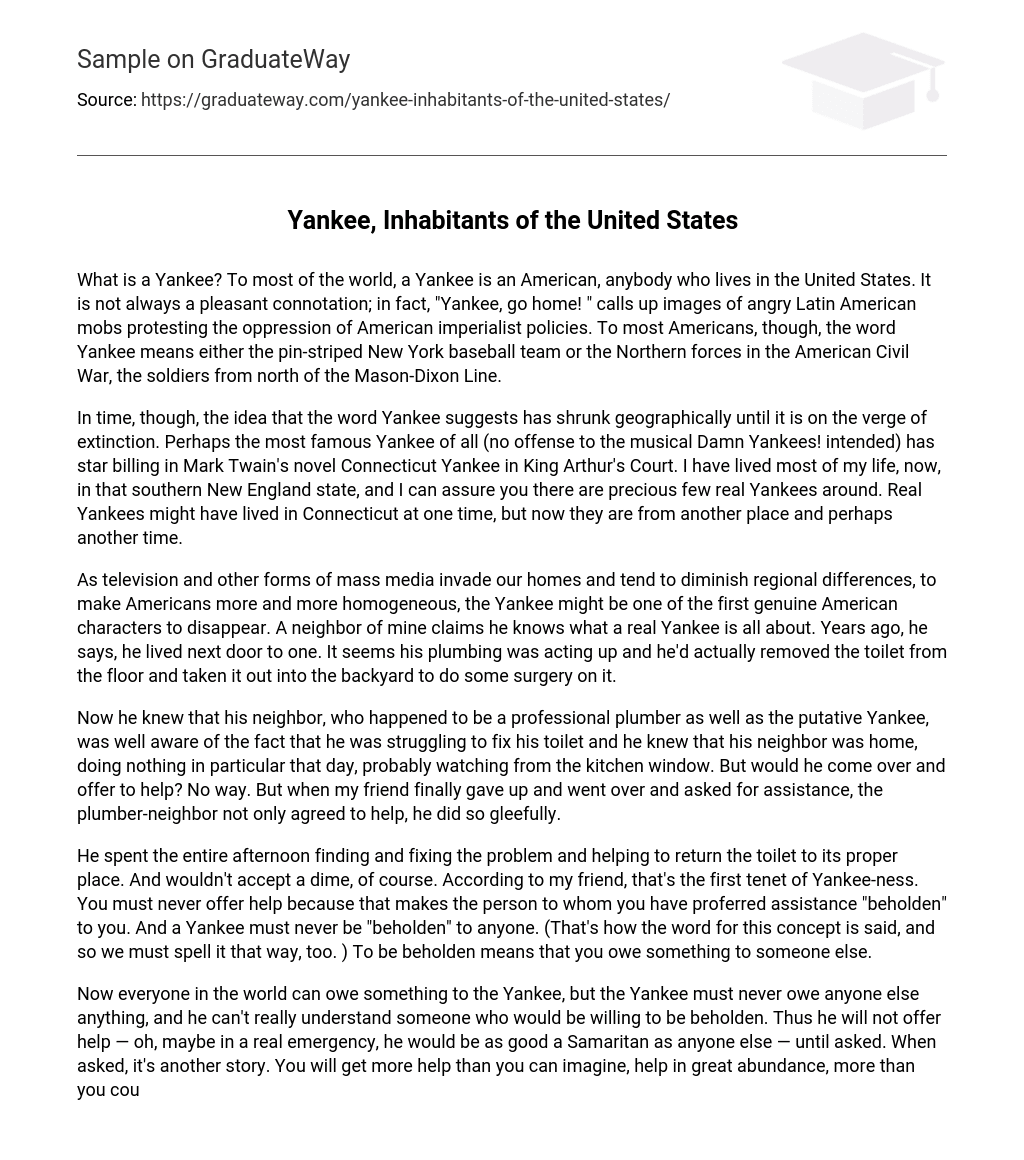What is a Yankee? To most of the world, a Yankee is an American, anybody who lives in the United States. It is not always a pleasant connotation; in fact, “Yankee, go home! ” calls up images of angry Latin American mobs protesting the oppression of American imperialist policies. To most Americans, though, the word Yankee means either the pin-striped New York baseball team or the Northern forces in the American Civil War, the soldiers from north of the Mason-Dixon Line.
In time, though, the idea that the word Yankee suggests has shrunk geographically until it is on the verge of extinction. Perhaps the most famous Yankee of all (no offense to the musical Damn Yankees! intended) has star billing in Mark Twain’s novel Connecticut Yankee in King Arthur’s Court. I have lived most of my life, now, in that southern New England state, and I can assure you there are precious few real Yankees around. Real Yankees might have lived in Connecticut at one time, but now they are from another place and perhaps another time.
As television and other forms of mass media invade our homes and tend to diminish regional differences, to make Americans more and more homogeneous, the Yankee might be one of the first genuine American characters to disappear. A neighbor of mine claims he knows what a real Yankee is all about. Years ago, he says, he lived next door to one. It seems his plumbing was acting up and he’d actually removed the toilet from the floor and taken it out into the backyard to do some surgery on it.
Now he knew that his neighbor, who happened to be a professional plumber as well as the putative Yankee, was well aware of the fact that he was struggling to fix his toilet and he knew that his neighbor was home, doing nothing in particular that day, probably watching from the kitchen window. But would he come over and offer to help? No way. But when my friend finally gave up and went over and asked for assistance, the plumber-neighbor not only agreed to help, he did so gleefully.
He spent the entire afternoon finding and fixing the problem and helping to return the toilet to its proper place. And wouldn’t accept a dime, of course. According to my friend, that’s the first tenet of Yankee-ness. You must never offer help because that makes the person to whom you have proferred assistance “beholden” to you. And a Yankee must never be “beholden” to anyone. (That’s how the word for this concept is said, and so we must spell it that way, too. ) To be beholden means that you owe something to someone else.
Now everyone in the world can owe something to the Yankee, but the Yankee must never owe anyone else anything, and he can’t really understand someone who would be willing to be beholden. Thus he will not offer help — oh, maybe in a real emergency, he would be as good a Samaritan as anyone else — until asked. When asked, it’s another story. You will get more help than you can imagine, help in great abundance, more than you could ever deserve or pay back. So it’s not that Yankees are stingy; on the contrary, a Yankee is generous to a fault.
But there is a sense of reserve that prohibits the true Yankee from offering help before being asked. The sense of inviolate space is paramount: “Good fences make good neighbors,” says the neighbor in Robert Frost’s poem, “Mending Wall,” and the Yankee will not cross the fence until asked. Another friend of mine knows someone, a Yankee, a chap born so far north in Vermont that he’s nearly Canadian, who comes over to help with his taxes ever year. To re-pay him, my friend must resort to trickery, leaving something on the doorstep in the middle of the night.
To offer anything else, up front, might tip the beholden scales in his favor and that would be risky. That’s what I think defines this dying breed of the American Yankee: an extraordinary sense of balance and reserve, a holding off — and yet, behind all that reserve, a reservoir of generosity and friendliness that can be nearly overwhelming. Questions: * Are there any fresh ideas enlisted in this definition? * How would you have defined this idea? Are there ideas similar to it that you could choose to define? There are allusions here: (1) to the musical Damn Yankees! , (2) to the Bible (the parable of the Good Samaritan), and (3) to a poem by Robert Frost. Do these allusions add anything to the essay or to your understanding of things? What if you didn’t “get” the allusions? * What techniques of development does the essay use in the process of definition? Do you think the writer dwelt too long on what a Yankee is not before moving on to what a Yankee is? * Can you point to one sentence that functions as thesis statement in this essay? |





